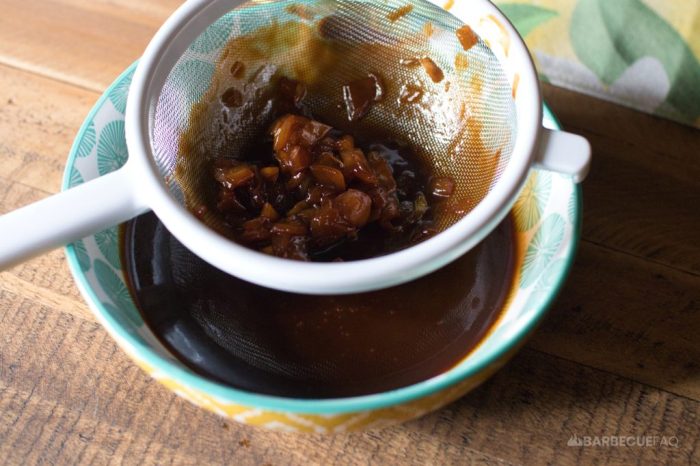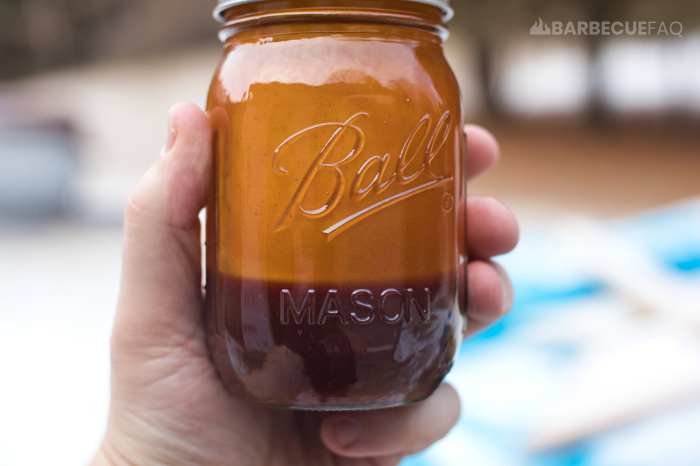Barbecue Sauce Recipes From Scratch
Homemade Barbecue Sauce: A Flavor Journey from Scratch: Barbecue Sauce Recipes From Scratch

Source: barbecuefaq.com
Barbecue sauce recipes from scratch – The alluring aroma of smoky, tangy barbecue sauce conjures images of summer gatherings and mouthwatering feasts. Creating this culinary staple from scratch offers a rewarding experience, allowing for complete control over flavor profiles and ingredient quality. Unlike store-bought versions, homemade barbecue sauce boasts superior taste, freshness, and the satisfaction of crafting something truly unique.
Introduction to Homemade Barbecue Sauce
Making barbecue sauce from scratch unlocks a world of flavor customization. You can precisely tailor the sweetness, spiciness, and tanginess to your preferences, resulting in a sauce that perfectly complements your culinary creations. This contrasts sharply with store-bought sauces, which often contain preservatives, high fructose corn syrup, and artificial flavors that can compromise taste and overall quality. Barbecue sauce’s history is rich and varied, tracing its origins back to the American South, with distinct regional styles emerging over time.
Carolina-style sauces, for instance, are often vinegar-based, while Kansas City boasts a thicker, tomato-based variety. Texas styles lean towards a spicier profile, highlighting the diverse regional interpretations of this classic condiment.
Essential Ingredients and Their Roles, Barbecue sauce recipes from scratch
The foundation of any great barbecue sauce lies in the quality and balance of its ingredients. Each component plays a vital role in shaping the final flavor profile. Understanding these roles empowers you to create a truly exceptional sauce.
Vinegar provides acidity, balancing sweetness and adding a sharp, tangy note. Different vinegars impart distinct flavors; apple cider vinegar offers a subtle sweetness, while white vinegar provides a cleaner, more assertive tang. High-quality ingredients are paramount. Using ripe, flavorful tomatoes, good-quality vinegar, and freshly ground spices significantly elevates the overall taste.
| Ingredient | Function | Potential Substitutions |
|---|---|---|
| Tomatoes | Provides sweetness and body | Tomato paste, tomato purée |
| Vinegar | Adds acidity and tang | Lemon juice, lime juice |
| Sugar (brown or granulated) | Provides sweetness and balances acidity | Honey, maple syrup, agave nectar |
| Spices (e.g., paprika, chili powder, garlic powder, onion powder) | Adds depth of flavor and heat | Substitute with your favorite spice blends |
Basic Barbecue Sauce Recipe Variations
Here are three foundational barbecue sauce recipes, each offering a distinct flavor profile. These serve as excellent starting points for your culinary experimentation.
Tomato-Based Barbecue Sauce:
- 28 oz canned crushed tomatoes
- 1 cup apple cider vinegar
- 1/2 cup brown sugar
- 2 tablespoons smoked paprika
- 1 tablespoon garlic powder
- 1 tablespoon onion powder
- 1 teaspoon cayenne pepper (or to taste)
- Salt and black pepper to taste
Instructions: Combine all ingredients in a saucepan. Bring to a simmer, reduce heat, and cook for at least 30 minutes, stirring occasionally, until thickened. Adjust sweetness, spiciness, and tanginess to your liking.
Crafting barbecue sauce from scratch allows for complete control over flavor profiles. A great starting point is often a foundational recipe, which you can then adapt to suit different meats; for example, you might find inspiration in the specific techniques highlighted in these barbecue sauce recipes for chicken , which offer a delicious starting point for your own creations.
Ultimately, experimenting with homemade barbecue sauce opens a world of culinary possibilities.
Vinegar-Based Barbecue Sauce:
- 1 cup apple cider vinegar
- 1/2 cup brown sugar
- 1/4 cup ketchup
- 2 tablespoons Worcestershire sauce
- 1 tablespoon Dijon mustard
- 1 teaspoon black pepper
- 1/2 teaspoon cayenne pepper (or to taste)
- Salt to taste
Instructions: Combine all ingredients in a saucepan. Bring to a simmer, reduce heat, and cook for 15-20 minutes, stirring occasionally, until slightly thickened. Adjust to taste.
Mustard-Based Barbecue Sauce:
- 1 cup yellow mustard
- 1/2 cup brown sugar
- 1/4 cup apple cider vinegar
- 2 tablespoons Worcestershire sauce
- 1 tablespoon paprika
- 1 teaspoon garlic powder
- 1/2 teaspoon black pepper
- 1/4 teaspoon cayenne pepper (or to taste)
- Salt to taste
Instructions: Combine all ingredients in a saucepan. Bring to a simmer, reduce heat, and cook for 10-15 minutes, stirring occasionally, until slightly thickened. Adjust to taste.
Advanced Techniques and Flavor Profiles

Source: barbecuefaq.com
Achieving a truly exceptional barbecue sauce involves exploring advanced techniques and flavor combinations. A smoky flavor can be imparted without a smoker by using liquid smoke (added sparingly) or by incorporating smoked paprika or chipotle peppers. Different peppers, such as jalapeños, habaneros, or ghost peppers, offer varying levels of heat, allowing for precise control over spiciness. Uncommon ingredients can add unique depth and complexity.
For instance, fruit (e.g., peaches, apricots) can add sweetness and acidity, while coffee or chocolate can introduce unexpected notes of bitterness and richness. A balanced sauce harmoniously blends sweet, smoky, and spicy elements, creating a complex and memorable taste experience.
Recipe Customization and Storage
Adapting recipes to personal preferences is key to creating a truly satisfying sauce. Dietary restrictions can be easily accommodated; for example, sugar substitutes can be used for low-sugar options, and gluten-free Worcestershire sauce is readily available. Proper storage is crucial for maximizing shelf life. Store homemade barbecue sauce in airtight containers in the refrigerator for up to a week or freeze for longer storage (up to 3 months).
To thicken the sauce, simmer it uncovered for a longer period; to thin it, add a little water or vinegar.
- Always wash your hands thoroughly before handling food.
- Use clean utensils and equipment.
- Cook barbecue sauce to a safe internal temperature.
- Refrigerate leftovers promptly.
- Discard any sauce that shows signs of spoilage.
Serving Suggestions and Pairings
Homemade barbecue sauce is incredibly versatile. It excels as a dipping sauce for meats, vegetables, and fries. It can also be used as a marinade for chicken or pork, adding intense flavor before grilling or baking. As a glaze, it adds a glossy finish and a burst of flavor to grilled meats. Visual appeal is important; a vibrant color and glossy texture enhance the overall presentation.
| Barbecue Sauce Type | Recommended Food Pairings | Serving Suggestions |
|---|---|---|
| Tomato-based | Pulled pork, ribs, brisket | Dipping sauce, glaze |
| Vinegar-based | Chicken, fish, vegetables | Marinade, dipping sauce |
| Mustard-based | Grilled sausages, burgers, fries | Dipping sauce |
Question & Answer Hub
How long does homemade barbecue sauce last?
Properly stored in the refrigerator, homemade barbecue sauce can last for up to two weeks. Freezing extends its shelf life to several months.
Can I use different types of sugar in barbecue sauce?
Yes, brown sugar, granulated sugar, honey, or maple syrup can all be used, each imparting a unique flavor profile. Experiment to find your favorite!
What if my barbecue sauce is too thick or too thin?
Add a little water or vinegar to thin it, or simmer it uncovered to reduce the liquid and thicken it.
How can I make my barbecue sauce spicier?
Add more chili powder, cayenne pepper, or chopped jalapeños to increase the heat level.





















